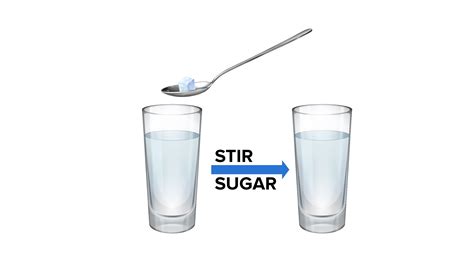Glucose is a simple sugar that is the body’s main source of energy. It is a white, crystalline powder that is soluble in water. When glucose dissolves in water, it forms a clear, colorless solution.

The Structure of Glucose
Glucose is a monosaccharide, which means that it is made up of a single sugar unit. The chemical formula for glucose is C6H12O6. The molecule consists of six carbon atoms, twelve hydrogen atoms, and six oxygen atoms. The carbon atoms are arranged in a ring structure, with the hydrogen and oxygen atoms attached to the carbon atoms.
The Polarity of Glucose
Glucose is a polar molecule, which means that it has a positive end and a negative end. The positive end of the molecule is the carbon atoms, and the negative end of the molecule is the oxygen atoms. The polarity of glucose allows it to interact with water molecules, which are also polar.
The Hydrogen Bonding of Glucose
Water molecules are polar, and they are attracted to each other by hydrogen bonding. Hydrogen bonding is a type of intermolecular force that occurs when a hydrogen atom is bonded to a highly electronegative atom, such as oxygen or nitrogen. The hydrogen atom has a partial positive charge, and the electronegative atom has a partial negative charge. The partial positive charge of the hydrogen atom is attracted to the partial negative charge of the electronegative atom, and this attraction creates a hydrogen bond.
When glucose dissolves in water, the polar glucose molecules are attracted to the polar water molecules by hydrogen bonding. The hydrogen bonds between the glucose molecules and the water molecules hold the glucose molecules in solution.
The Factors that Affect the Solubility of Glucose
The solubility of glucose in water is affected by several factors, including the temperature of the water, the concentration of glucose in the water, and the presence of other solutes in the water.
- Temperature: The solubility of glucose in water increases with increasing temperature. This is because the hydrogen bonds between the glucose molecules and the water molecules become weaker at higher temperatures, and the glucose molecules are more easily able to move around in the water.
- Concentration: The solubility of glucose in water decreases with increasing concentration. This is because the more glucose molecules that are present in the water, the more likely they are to collide with each other and form hydrogen bonds with each other. When the glucose molecules form hydrogen bonds with each other, they are less likely to form hydrogen bonds with the water molecules, and they are more likely to precipitate out of solution.
- Presence of Other Solutes: The presence of other solutes in the water can affect the solubility of glucose. Some solutes, such as salt, can decrease the solubility of glucose in water. This is because the salt ions can compete with the glucose molecules for hydrogen bonds with the water molecules. Other solutes, such as alcohol, can increase the solubility of glucose in water. This is because the alcohol molecules can break up the hydrogen bonds between the glucose molecules and the water molecules.
The Applications of Glucose
Glucose is a versatile molecule that has a wide range of applications. It is used as a food source, a sweetener, and a starting material for the production of other chemicals.
- Food source: Glucose is the body’s main source of energy. It is found in a variety of foods, including fruits, vegetables, and grains. The body breaks down glucose into energy that can be used to power the body’s cells.
- Sweetener: Glucose is a natural sweetener that is used in a variety of foods and beverages. It is less sweet than sucrose, but it does not have the bitter aftertaste of saccharin.
- Starting material for the production of other chemicals: Glucose is a starting material for the production of a variety of other chemicals, including ethanol, lactic acid, and citric acid. These chemicals are used in a variety of industries, including the food, beverage, and pharmaceutical industries.
Tips and Tricks for Dissolving Glucose in Water
Here are a few tips and tricks for dissolving glucose in water:
- Use warm water. Glucose dissolves more easily in warm water than in cold water.
- Stir the solution. Stirring the solution will help to dissolve the glucose more quickly.
- Add a small amount of acid. A small amount of acid, such as lemon juice or vinegar, can help to dissolve glucose more quickly.
- Use a solvent other than water. Glucose can also be dissolved in other solvents, such as alcohol or acetone.
FAQs
Q: Why is glucose soluble in water?
A: Glucose is soluble in water because it is a polar molecule that can form hydrogen bonds with water molecules.
Q: What factors affect the solubility of glucose in water?
A: The solubility of glucose in water is affected by the temperature of the water, the concentration of glucose in the water, and the presence of other solutes in the water.
Q: What are some applications of glucose?
A: Glucose is used as a food source, a sweetener, and a starting material for the production of other chemicals.
Q: How can I dissolve glucose in water more quickly?
A: You can dissolve glucose in water more quickly by using warm water, stirring the solution, adding a small amount of acid, or using a solvent other than water.
